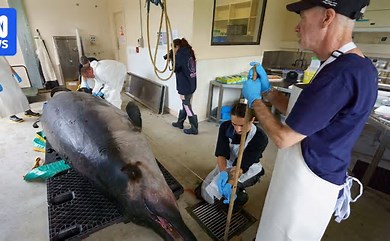New Zealand scientists have begun a groundbreaking dissection of the spade-toothed whale, considered the rarest whale in the world. The elusive species has only been documented seven times, with no live sightings recorded to date.
Discovery and Significance
The five-meter-long spade-toothed whale washed ashore earlier this year on New Zealand’s South Island, offering researchers an unprecedented opportunity to study this enigmatic species.
- First Complete Dissection: Marine expert Anton van Helden emphasized the global importance of this rare event, marking the first-ever dissection of a complete spade-toothed whale specimen.
- Scientific Goals: The study aims to understand the whale’s behavior, diet, and anatomy, filling significant gaps in marine biology knowledge.
A Rare Marine Mammal
The spade-toothed whale belongs to the beaked whale family, known for their deep-diving capabilities and elusive nature.
- Historical Background: The species was first described in 1874 from skeletal remains collected in New Zealand’s Chatham Islands.
- Limited Specimens: Only seven specimens have been documented worldwide, making this discovery globally significant.
Challenges in Researching Beaked Whales
Van Helden described beaked whales as the “most enigmatic group of large mammals,” rarely seen at sea due to their deep-diving behavior. This rarity has made them one of the least understood marine species.
Conservation Status
The spade-toothed whale is classified as “data deficient” under New Zealand’s Threat Classification System. The lack of live sightings and limited specimens highlight the need for continued research and conservation efforts.
Conclusion
This week-long dissection marks a pivotal moment in marine biology, shedding light on one of the ocean’s most mysterious inhabitants. The findings will not only contribute to understanding the spade-toothed whale but also advance the broader study of marine biodiversity.













